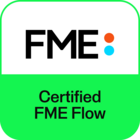Hi @lazarlubomir,
Since we were able to come to a resolution through a case I just wanted to share our findings here as well in case anyone else is looking for answers on this.
The main issue you were having is that you needed the Token to change everytime a request was submitted as you were using this token as a unique ID to name files/folders in your workflows as well. However this became a problem when you introduced parallel processing of requests because once a new ID was generated, any requests still needing to be processed with the old Token failed with an authentication error.
This is because in FME 2018.1 and older users are only eligible to have one session token at a time. Therefore in order to overcome this there were two options:
1. Give the guest account permissions to the repository containing the processing workspaces, this will remove the requirement for authorization via a token and the the workspace and data download requests will be able to run with unauthenticated access, but you can still generate the tokens to be used for file names (https://docs.safe.com/fme/html/FME_Server_Documentation/AdminGuide/Configuring-Authentication-for-Security-Resources.htm)
2. Generating a single token to be used for all requests that has a long expiry date and then using another method to name your files, a timestamp or UUID perhaps.
Alternatively in 2019+ the Token Management service was completely redone and now supports multiple valid session tokens created by a single user, meaning you could continue generating a new token for each series of requests and have these running in parallel.









